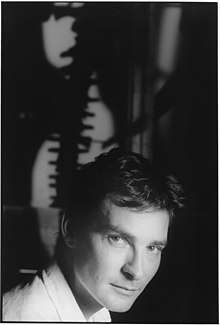Ben Bartlett
Ben Bartlett (born in 1965) is a British composer known for his numerous Film and Television scores including Walking with Dinosaurs, Vera, The Tunnel and Lucky Man.

Working and living in London, Ben Bartlett was educated there, attending Westminster City grammar school, and Pimlico Comprehensive Special Music School. He received piano tuition under the noted concert pianist Albert Ferber. Bartlett read music at Royal Holloway College, London University, where he rubbed shoulders with the drama department, discovering composition for theatre. Bartlett was commissioned by the College, whilst a student, to compose and direct a musical celebrating the centenary of Royal Holloway College, performed on site in 1986 by the drama and music departments. He later studied composition at Guildhall School of Music and Drama, where he won the Lutoslawski prize for composition. Bartlett was busy composing music for TV commercials when he met Tim Haines and the BBC team devising a pioneering documentary combining 3D animated dinosaurs and 35mm film: Walking with Dinosaurs.
Screen Music
Bartlett first came into prominence with his score for Walking with Dinosaurs in 1999, for which he won a BAFTA in 2000 and was nominated for a Primetime Emmy Award in the same year. Bartlett has received several other award nominations including an Ivor Novello nomination for his score for BBC Scotland's TV Film: Fiona's Story, and several RTS nominations for his music for screen including the film The Mark Of Cain directed by the award-winning Marc Munden.
Ben Bartlett is also known for his much loved music to the highly popular long running ITV Series Vera, airing to audiences in excess of 6 million, starring Brenda Blethyn. Recently Bartlett's music has been heard on the Sky 1 hit series Stan Lee's Lucky Man; the ITV series The Loch, as well as the critically acclaimed Kudos production for Sky Atlantic: The Tunnel starring Stephen Dillane and Clémence Poésy. Bartlett has also worked with Ray Winstone on the ITV Drama The Trials Of Jimmy Rose directed by Adrian Shergold, with whom Bartlett also collaborated on the 3-part TV epic He Kills Coppers based on the Jake Arnot novel.
Concert Music
Debuting as a pianist at The Purcell Room aged 14, Bartlett went on to receive critical acclaim for his mini-opera El Tigre, a setting for chamber ensemble and mezzo soprano of the Pablo Neruda poem of the same name. Premiered at the 1995 season of the Covent Garden Festival, and performed at the Donmar Warehouse, Covent Garden, the Hispanic/Latin influenced fusion of flamenco, tango and opera was conducted by Charles Hazlewood and performed by Maria Koripas. Bartlett composed his suite for string orchestra Nine, based on fragments of Ravel's String Quartet, performed at Leighton House Museum by the Dallapicolla Ensemble under the baton of Luigi Suvini. Bartlett's piano music was performed at the Queen Elizabeth Hall by Louis Alvanis, and the Piano Trio Three was performed at St Martins In The Field by the Chamber Music Company under Mark Troop. Bartlett was later commissioned to write for The Dancer On The Point Of Being Undressed performed at The Place in London, UK.
Other Activities
Bartlett has been in demand as a speaker in Australia, Germany and London and has been invited to lecture at the Royal College Of Music and The National Film And Television School UK. Bartlett has been in demand as a judge on the BAFTA and Ivor Novello awards panels on several occasions.
Awards
- 2000 - won the BAFTA in the category "Best Original Television Music" for Walking with Dinosaurs (1999).
- 2000 - Primetime Emmy Award nomination for Walking with Dinosaurs
- 2005 - RTS nomination for titles music for TV Series The Ghost Squad
- 2007 - RTS nomination for best score for The Marc Of Cain movie
- 2009 - Ivor Novello Award nomination for best TV Score for BBC Film Fiona's Story
- 2009 - RTS nomination for best score for Mutual Friends TV Series